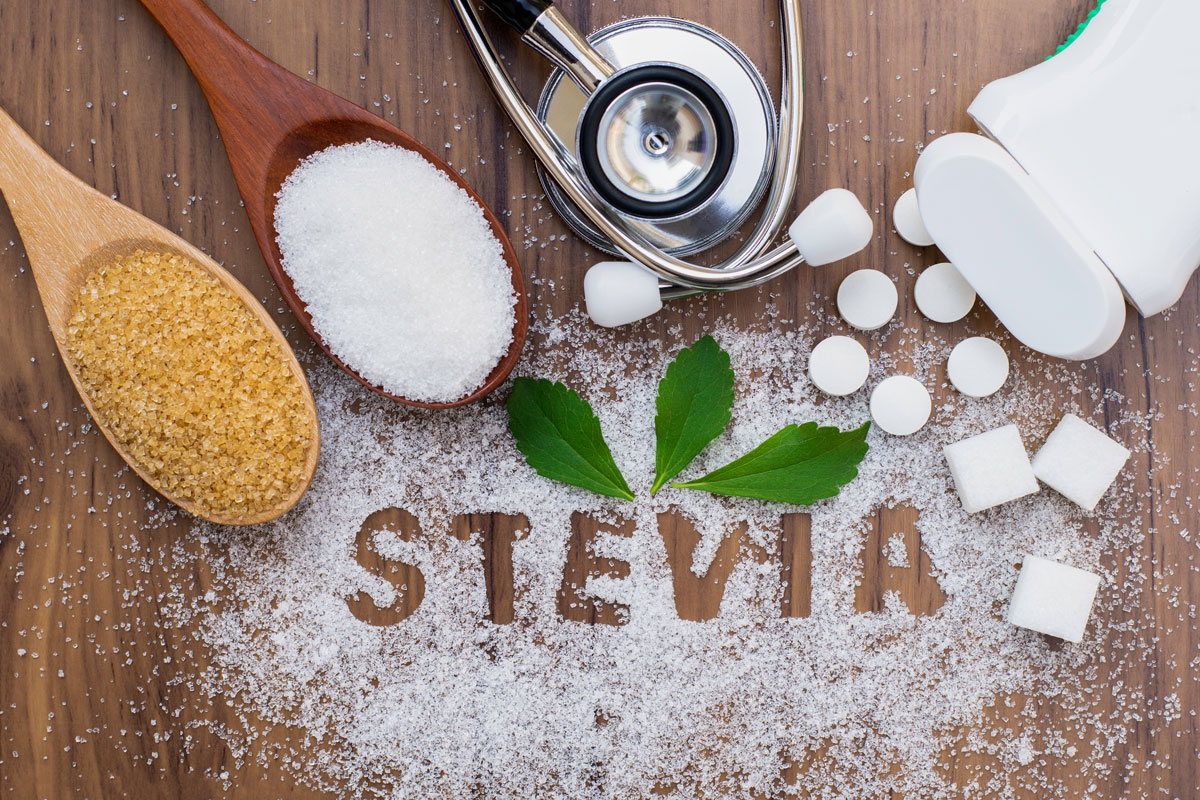A simple visit to a local coffee shop and you will see a veritable rainbow of sweeteners to choose from. From blue and pink to yellow, green, and brown packets, there is certainly not a lack of options if you like your coffee or tea on the sweeter side. Stevia is one of two sugar alternatives approved by the Food and Drug Administration (FDA) that are plant-based and non-artificial1.
What is Stevia?
Stevia is a plant-derived, non-nutritive sweetener containing zero calories or sugar. Stevia comes from the plant stevia rebaudiana, which is native to Brazil and Paraguay. One of the key factors to glean from the stevia plant is that it contains multiple incredibly sweet compounds known as glycosides. An extraction process is used in order to remove these compounds from the stevia leaves. The glycosides can be isolated to form a concentrated resin by steeping the stevia leaves in water2.
“Stevia is typically 200-300 times sweeter than table sugar with zero calories.”
Stevia is sold under the brand names SweetLeaf, Truvia, PureVia, and Stevia-in-the-Raw. Most of us recognize it as the green packet in the sea of colorful sugar alternatives. Stevia is now being used in products such as:
- Dannon Light & Fit Yogurt
- Triple Zero Yogurt
- Coca-Cola Life
- Skinny Cow’s Ice Cream
- Breyer’s Delights Ice Cream
- Capri Sun Sport3
Why Is Stevia Better Than Other Sugar Alternatives?
There is overwhelming information online about sugar alternatives’ pros and cons. An essential factor to remember is that stevia is plant-based and not created in a lab. Monk fruit and stevia are the two sweeteners the FDA has granted GRAS (Generally Recognized As Safe) status. Globally, stevia is also highly regarded as a safe sugar alternative. In Japan, where all artificial sweeteners were banned almost 50 years ago, stevia is available on the market4.
Using Stevia in Baking & Cooking
If you are trying to slim down, a great way to help this process is to substitute stevia for sugar in recipes. The plant compounds in stevia are heat-stable, meaning they are not changed or destroyed when subjected to high temperatures. As opposed to artificial sweeteners, stevia is excellent to use while baking due to this stability. Manufacturers make it easy for consumers by placing recipes on their packaging, and there is also a conversion chart available online at stevia.com. Switching from sugar to stevia allows you to lose weight without giving up some of your favorite baked goods and sweet treats5.
Using Stevia to Manage Blood Sugar Levels
“In a joint statement, the American Heart Association (AHA) and the American Diabetes Association (ADA) said that stevia and similar sweeteners can be beneficial for people with diabetes if they use them appropriately and do not compensate by eating extra calories at later meals6.”
Stevia has grown in popularity among people living with diabetes. The versatility of stevia is one of its positive attributes, along with its ability to help manage one’s blood sugar. This is not to state that stevia should be used as a substitute for a diabetic’s normal medical regimen. Used as a sugar alternative, stevia can help manage diabetes in multiple ways. Some of these ways are the following:
- Reduced triglyceride and cholesterol levels.
- Improved blood sugar control.
- Improved feeling of fullness
- Improved protection against liver and kidney damage.
- Reduced hunger6.
This plant-derived sugar alternative is showing up in more and more consumer products due to its health benefits and great taste. In addition, most say that stevia lacks the bitter after-taste that most artificial sweeteners leave. So next time you are at the coffee bar faced with the choice of a rainbow array of sugar alternatives, green stevia is your best bet.
Contact your sales rep. or email us at sales@vitajoyusa.com to take advantage of special pricing.
**These statements have not been evaluated by the FDA. This product is not intended to diagnose, treat, cure or prevent any disease.
References:
- Stevia Vs. Splenda: Which Sugar Substitute is Healthier? https://www.purewow.com/food/stevia-vs-splenda.
- Everything You Need to Know About Stevia Sweeteners, https://foodinsight.org/everything-you-need-to-know-about-stevia-sweeteners/.
- Is Stevia Safer Or Healthier Than Artificial Sweeteners? https://www.cookinglight.com/eating-smart/nutrition-101/is-stevia-sweetener-safe-or-healthy.
- Has The FDA Approved Stevia? https://www.stevia.com/2016/10/03/has-the-fda-approved-stevia/.
- How Do You Use Stevia, https://internationalsteviacouncil.org/how-do-you-use-stevia/.
- Stevia And Diabetes, https://www.medicalnewstoday.com/articles/323376#stevia-and-diabetes.
